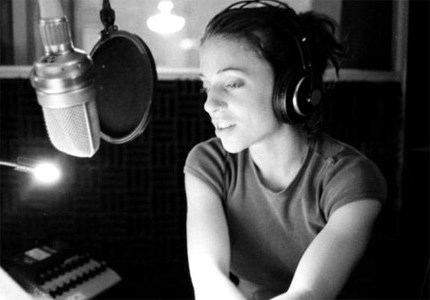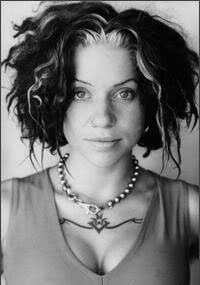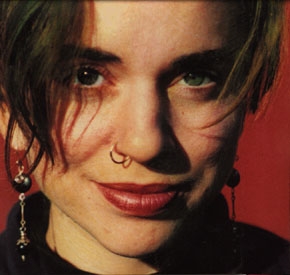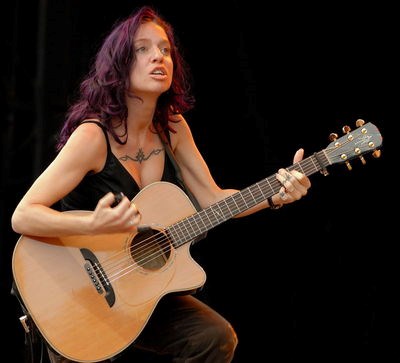 |
| (www.pastemagazine.com/.../27/ani-difranco-m.jpg) |
“Be yourself. Above all, let who you are, what you are, what you believe, shine through every sentence you write, every piece you finish” (John Jakes). Not many people can honestly say they stand for what they believe in at every given moment; it takes courage and willpower to face opposing minds. Couple those characteristics with charisma, and you have a force to be reckoned with: a hero powered by the strength of her own beliefs. Add pure talent and a wise soul, and only one person remains—Ani DiFranco, a young folksinger. Ani DiFranco exemplifies a wise, fearless leader through the rise of her career and the doors she opens for other women, as well as her work to amend communal concerns through her powerful lyrics. Additionally, she is an inspiration to others, adding an independent, confident role model to society.
Ani DiFranco, born "Angela Marie DiFranco," began her life on September 23, 1970 in a small, working class neighborhood. Both her parents were creative, filling DiFranco's childhood with art and possibilities. When she was nine, her parents presented her with an acoustic guitar and a Beatles song book, unknowingly sealing her fate as a singer. She quickly fell in love with music, and just a few years later, she got her first taste of the life of a musician. With the help of a local folksinger, Ani DiFranco began singing at local coffeehouses and, eventually, bars and clubs. By the time she was nineteen, she officially began her livelihood, selling the first, self-titled album from the trunk of her car. Every subsequent year from 1990 to 2008, she produced nearly an album a year, each song different from the next. With such a strong foundation, nothing could deter her from the path to success.
 |
| (images.emusic.com/.../116/085/11608597.jpeg) |
Throughout the rise of her career, Ani DiFranco has proved to be a brave and assertive trailblazer for women in the music industry. After having turned down many major music labels, Ani DiFranco explained, "I don't think the music industry is conductive to artistic and social change and growth. It does a lot to exploit and homogenize art and artists. In order to challenge the corporate music industry, I feel it necessary to remain outside it... It's more interesting to try and hammer out an alternative route without the music industry and maybe be an example for other musicians" (Moffett). DiFranco is one of the few musicians both wise and talented enough to open her eyes to the assimilation music companies require. Not wanting her music--her art-- to sound redundant, she rejected the cover of large companies, instead creating her own rules and her own company, Righteous Babe Records (Moffett). Through Righteous Babe, DiFranco made it possible to develop, her own voice, and her own rules, greatly opening up her musical style and expression. The company has deals with about fifteen other artists, mostly women who likewise wanted to write their music without any fear of the media's exploitation. As Carrie Havranek illustrates, "DiFranco's success showed that a female musician did not have to fit into a music-industry pigeonhole; female musicians could be a multitude of complexities and still be successful." Multifaceted, Ani DiFranco leads the path through the music industry by blazing as many trails as possible for other women. Her success as a complex musician is rare, but is an encouragement to anyone just stepping over the threshold.
Additionally, Ani DiFranco shows heroism by giving voice to our nation's unspoken wars, and striving to undo their damage through her own work, and that of the community. She addresses common taboos, with her lyrics covering issues such as abortion, death, infidelity, body image, bisexuality, and abuse; "by embracing controversial issues, DiFranco hopes to diffuse them, discuss them, and deepen understanding of each topic's nuances" (Taylor). The fight against problems like infidelity, poor self-confidence and violence, and the controversy over homosexuality and abortion are a war most of us don't even realize is there, or choose to pretend doesn't exist. However, Ani DiFranco brings the muck to the surface through her lyrics, opening the eyes of the community, for the only way to begin to solve a problem is by admitting that one is there. And, as DiFranco says herself, "If we can bring ourselves to admit all this shit and then talk about it, I think we're that much better off" (Moffett). Through the more gentle cover of a song, Ani DiFranco eases the idea of her more perfect world to her fans, initiating the change she wants to see in the world. But DiFranco doesn’t just change the world by herself; she also involves anyone who’ll listen. In Ani DiFranco’s song “Face Up and Sing,” “she encourages her fans to be active and involved in not just their community but nationwide as well… Ani DiFranco encounters a female fan who’s thankful to her ‘for saying all the things I never do,’ to which she replies, ‘It’s nice that you listen. It’d be nice if you joined in” (Moffett). In these lyrics, Ani DiFranco doesn’t just talk about what’s wrong, she invites her fans to help her lead the change. Through everything she does, Ani DiFranco promotes a better world.
 |
| (www.nndb.com/people/774/000028690/aniface-80.jpg) |
Ani DiFranco is clearly a confident, independent person; an inspiration in the lives of girls. In an interview with Out Magazine, Ani DiFranco remarked, “’I just sing my goofy songs about my goofy little life,' underscoring the fact that she's her own person and without regard for those who make take offense at her uncensored output" (Taylor). DiFranco is both modest and a powerful role model. She is courageous and unintimidated by the remarks of those who disagree. She says what she means, rather that wishing she said what she meant, like the rest of us tend to do. Also, she is wise, eloquently declaring: "I speak without reservation from what I know and who I am. I do so with the understanding that all people should have the right to offer their voice to the chorus, whether the result is harmony or dissonance; the world-song is a colorless dirge without the differences that distinguish us, and it is that difference that should be celebrated, not condemned" (Moffett). In an age where everyone, especially females, must be perfect, and thus all the same, Ani DiFranco breaks from the mold and leads the path for others to see the light of a more diverse nation. Taking one step at a time, even through the subtlety of a song, Ani DiFranco is aspiring for a change. She is a prime example that it only takes one mind to get the ball rolling, and that the best person isn’t always the one from the cookie-cutter frame.
 |
| Ani DiFranco (www.womeninrock.com/Ani_DiFranco.jpg) |
Page created on 5/20/2010 12:00:00 AM
Last edited 5/20/2010 12:00:00 AM
"Difranco, Ani (1970–)." Dictionary of Women Worldwide: 25,000 Women through the Ages. Ed. Anne Commire and Deborah Klezmer. Vol. 1. Detroit: Yorkin Publications, 2007. 523.Gale Virtual Reference Library. Web. 3 May 2010.
Havranek, Carrie. "Difranco, Ani." Baker's Biographical Dictionary of Popular Musicians Since 1990. Ed. Stephen Wasserstein, Ken Wachsberger, and Tanya Laplante. Vol. 1. Detroit: Schirmer Reference, 2004. 183-184. Gale Virtual Reference Library. Web. 28 Apr. 2010.
Moffett, Jolee. “The Little FolkSinger That Could.” Literary Kicks: Opinions, Observations, and Research. April 23, 2003. Levi Asher. May 3, 2010.
Sheldon, Scott. "Ani Difranco: Red Letter Year." Sing Out! Summer 2009: 120+. General Reference Center Gold. Web. 28 Apr. 2010.
Taylor, B. Kimberly. "DiFranco, Ani (c. 1970-)." Newsmakers. Ed. Sean R. Pollock. Detroit: Gale Research, 1997. Student Resource Center - Gold. Gale. DEL NORTE HIGH SCHOOL. 27 Apr. 2010
Righteous Babe Records and Ani DiFranco's home page: http://www.righteousbabe.com/
A biography on Ani DiFranco: http://folkmusic.about.com/od/artistsaz/p/AniD_profile.htm
Ovierview of Ani DiFranco's career: http://www.columbia.edu/~marg/ani/
A compilation of all Ani DiFranco's song lyrics: http://www.danah.org/Ani/
